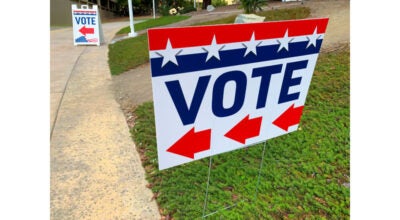The window is there to return to bipartisan compromise in 2022
Published 3:10 pm Friday, January 7, 2022
|
Getting your Trinity Audio player ready...
|
By Bob Lewis
Just don’t hold your breath.
The year 2021 was only six days old when it tipped its hand to the sort of politically riven year it would be.
Thousands of violent apostles of defeated President Donald Trump tried (and failed) to end nearly 250 years of American democracy by commandeering Congress’s constitutional duty to count the nation’s electoral votes that made Joe Biden the rightful next president.
On the pretext of correcting massive fraud that no one has come close to validating, this mob attacked and overran an understaffed contingent of police officers, invaded the seat of American representative democracy and treated it like a toilet.
The takeaway was jarring: that extremists who prefer an autocracy in their own image to a freely elected government and the rule of law consider bloodshed as an acceptable means to their desired end.
It seemed like an obituary for compromise and collegiality – for elemental decency in the civil process – at the time, and none of the findings the House’s Jan. 6 Commission has revealed thus far encourage any brighter conclusion.
In the moments after the attempted coup (including its stated goal of lynching a sitting vice president), Republicans and Democrats alike recoiled at the deadly event they had just survived, taking to the House and Senate floor in a fleeting moment of shared fear, if not unity, to condemn the sedition.
Since then, they’ve retreated to their corners to practice strident partisanship.
Then a funny thing happened in Virginia.
The state’s Republicans, weary of being punished election after election while Trump was either on the ballot or in the Oval Office, took advantage of the former president’s forced exile to Mar-a-Lago and nominated a gubernatorial candidate new to the game whom Democrats could not easily tie to Trump – even though they tried mightily. Glenn Youngkin paid sufficient obeisance to the deposed bloviator-in-chief to placate the GOP’s Trumpist base and win the nomination. Then he pulled off the political equivalent of a par 4 hole-in-one by successfully balancing fealty to Trump with distance from Trump – a long-odds gambit that was necessary to foil Democratic former Gov. Terry McAuliffe’s bid to get his old job back.
Youngkin’s win nudged Virginia’s political median from slightly left of center, where it had been for a decade, to slightly right of it, at least for last year’s election. He was able to energize Republicans and yield a record turnout, especially in GOP-friendly rural areas while persuading enough suburbanites to abandon their allegiance to the Democrats on Nov. 2.
Not only did Youngkin win, his party went from holding zero statewide elective offices to holding all three statewide posts – governor, attorney general and lieutenant governor – and a House of Delegates majority that, on Jan. 12, will end just two years of Democratic control.
The outcome presents a window of opportunity for Virginia’s elected leaders to abandon the trend toward governance by partisan spite and restore a measure of compromise if not revive the lost art of bipartisan comity.
Several factors create ideal conditions for a thaw in rigid ideologies, driven by each party’s fringes, and a greening of negotiated balance.
For one thing, if there is a mandate from November’s election, it’s not a partisan one. Youngkin won by less than 2 percentage points (about 63,000 votes out of a record 3.28 million cast in a gubernatorial election) and the GOP’s House majority is a mere two seats – hardly a landslide. What voters made clear is that they prefer a “Goldilocks” government – not too left, not too right.
So the popular moral underpinning for cooperation is clearly there. Voters have watched the pendulum of politics lurch wildly – even violently – in recent years, from out-of-control levels of wokeness and a boundless lust for ever-larger government on the leftist fringe to the alt-right’s naked contempt for social justice and democratic norms as well as its undisguised embrace of authoritarianism. The vast middle of Virginia in the autumn of 2021 stood up and screamed, “Enough!”
But if a moral basis for realpolitik collaboration won’t carry the day, maybe cold pragmatism will.
The bottom line is that with Democrats still in charge of the Senate for at least the next two years and the GOP running everything else, the choice is between compromise within a divided government or a deadlocked dysfunction that will accrue to neither party’s wellbeing.
Certainly, there will be GOP-led efforts originating in the House to roll back some of the Democrats’ signature legislative achievements the past two years, namely laws tightening gun laws and loosening restrictions on access to abortion services and voting.
The Senate is where most of those bills will go to die.
Conversely, we’ve seen how desperately aware some Democrats are of the same dynamic. Abortion-rights advocates have called for a rump special legislative session to hastily inscribe Roe v. Wade abortion rights protections into Virginia law before the GOP takes charge in barely two weeks. House Democratic leaders are willing to entertain the notion, but Senate Democratic leaders rightly dismiss it as “futile,” causing an intramural rift within the party.
Not that I predict that either moral or practical considerations will prevail and yield a more responsive, collaborative or moderate General Assembly and government. I am saying that the moment and the conditions exist to make that happen. I’d be surprised (pleasantly) if it does. But opportunities like this have been squandered before, and recently too.
Consider how, after decades of work, a new bipartisan commission on redistricting was finally added to the Virginia Constitution and brought into being this year only to asphyxiate on its own poisonous partisanship and utterly fail in its maiden voyage at the only task for which it was created.
I’ve been around long enough to see reflexive, unreasoning party allegiances take hold and calcify the legislative process. I have seen empty slogans and ad hominem attacks steadily supplant honest debate. Because elected officials fear their own primaries more than general election opponents, there’s a disincentive to bucking the party line. I have seen Republicans who practice statesmanship reviled by their own as RINOs and, more recently, the same from progressive Democrats toward those in their party who dare reach across the aisle. I’ve seen it chase some of the brightest and best public servants I’ve ever known – genuinely good men and women in both parties – out of elective politics.
That’s both the blessing and the curse of having covered politics and government for decades. Early on, you extend the benefit of the doubt freely, becoming more miserly with it over the years with each passing realization of how often it was betrayed. In its place grows a skepticism that can harden into cynicism, which is as much an enemy of the truth as naïveté.
Finally, you’re left only with hope to ward off the chill of pessimism about our body politic. For hope to survive, it needs occasional nourishment; to see those in whom we entrust great power act in harmony with the better angels of their nature.
Even now, though I scarcely expect it, hope still abides.
I dedicate this column to the memory of former state Sen. H. Russell Potts.
BOB LEWIS covered Virginia government and politics for 20 years for The Associated Press. Now retired from a public relations career at McGuireWoods, he is a columnist for the Virginia Mercury. He can be reached at blewis@virginiamercury.com.






